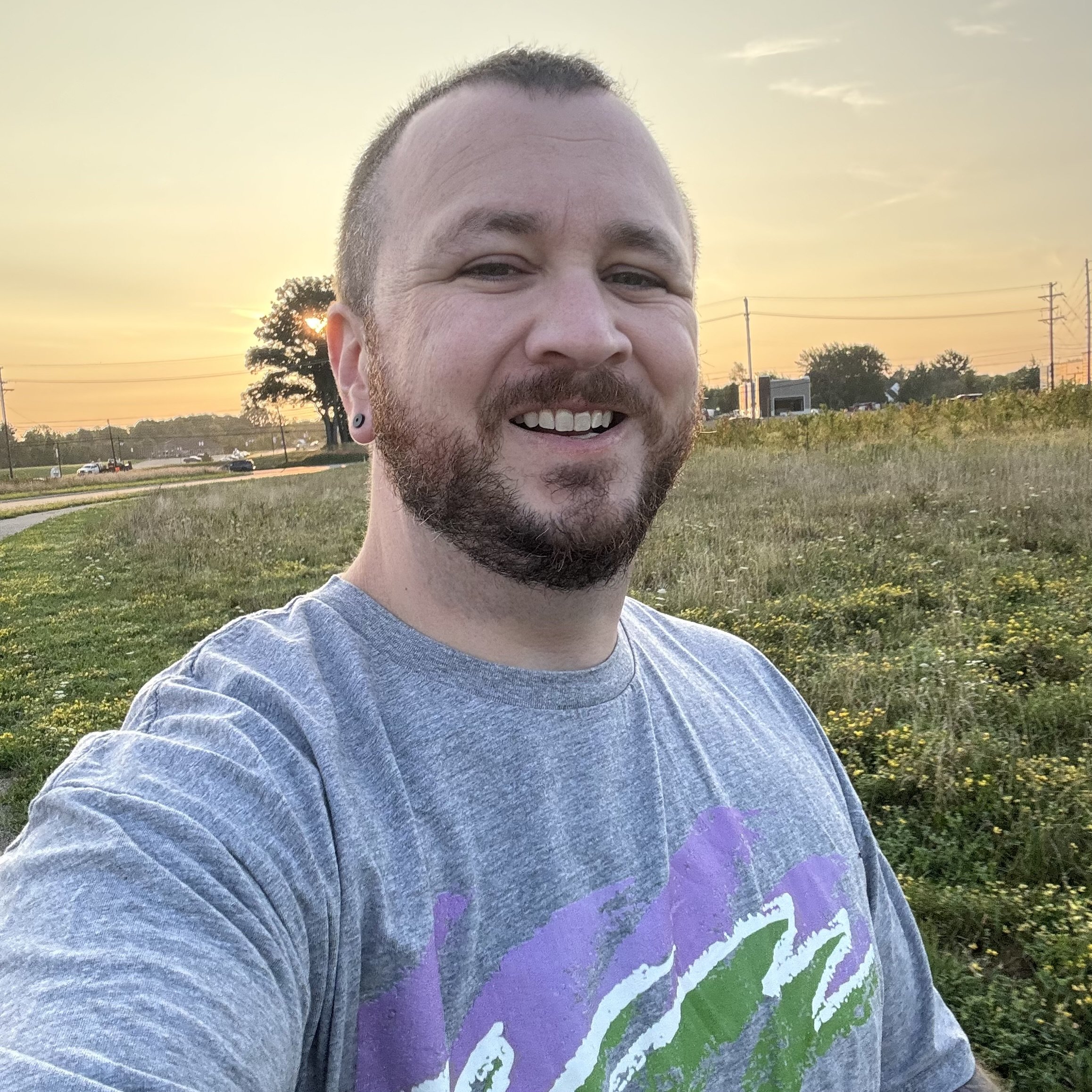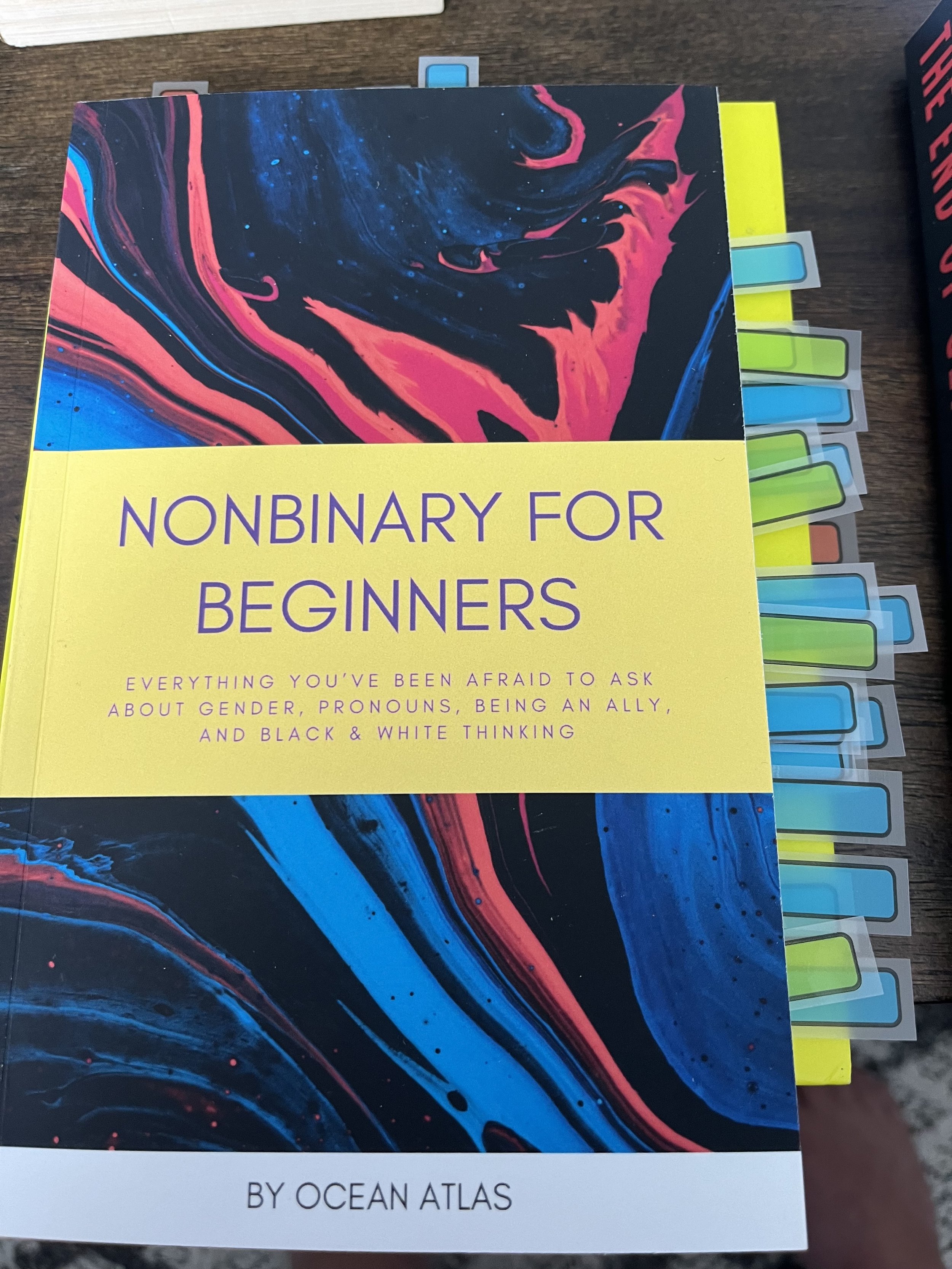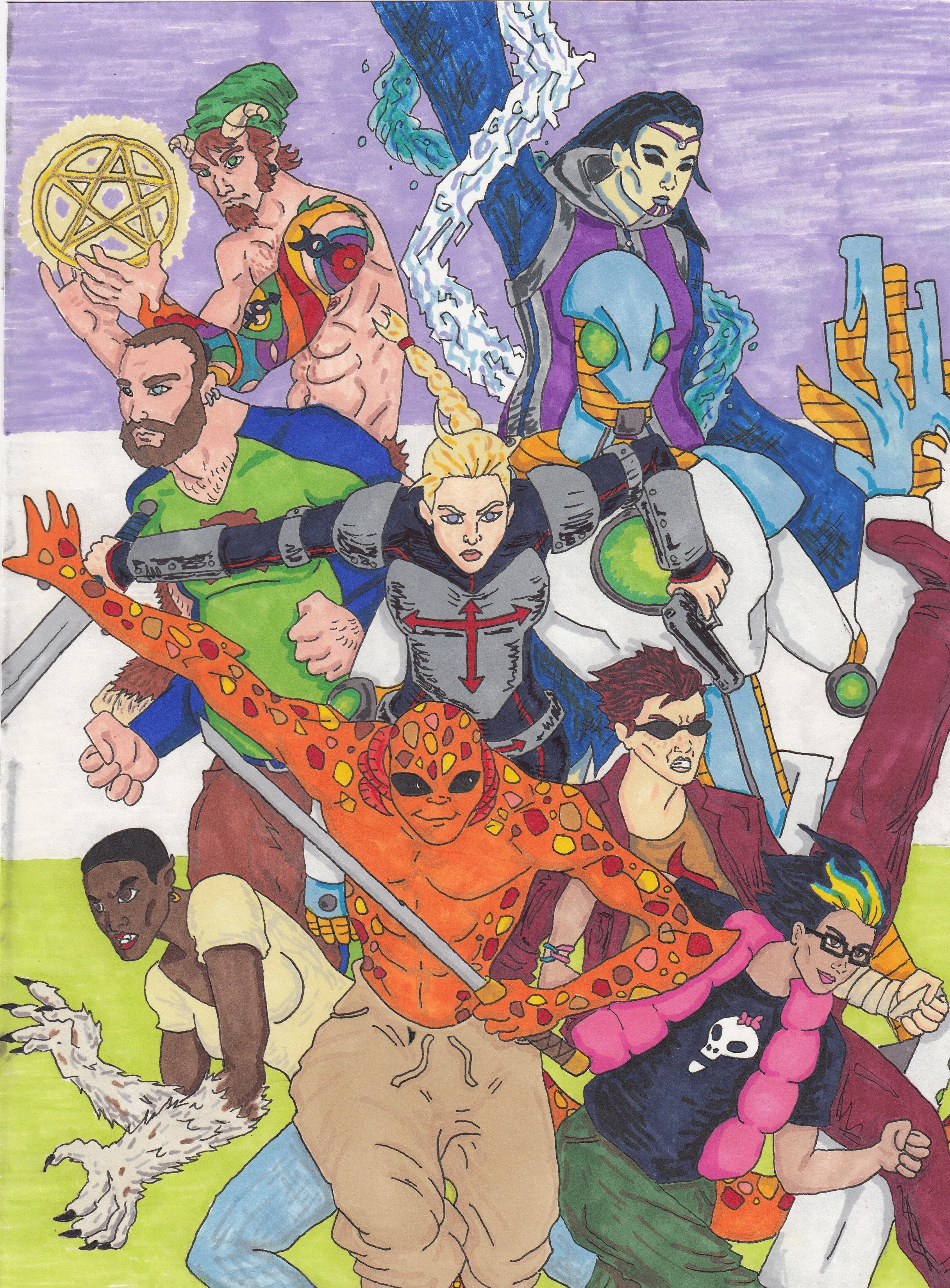A selfie of me wearing my Genderqueer Pride t-shirt
I’ve been wanting to write a blog post about gender identity for a while. I touched on it in another post, but it is this thing that’s been rattling around in my head for a while now that is asking me to dedicate a full post to it.
What prompted the desire to write a full post about it was an interaction with a friend. This person knows my husband more than she knows me, but she’s always been incredibly sweet and kind to me, and I really love and respect her a lot. I know she reads all of my blog posts, and she recently mentioned to me that she wanted to talk to me about gender after reading about it in my blog. A few weeks after she mentioned that, I happened to be at her house, and she brought the topic up. She asked me if I was using “they/them” pronouns. She mentioned that she had a friend come out to her as non-binary, and her reaction to that friend coming out to her was to research. She bought several books on the topic of being non-binary and on being an ally to non-binary people, and read them thoroughly, taking notes and bookmarking pages to reference later. Look at this photo of one of her books and the number of bookmarks she left for herself:
The book “Nonbinary for Beginners” by Ocean Atlas, with several bookmarked pages
She truly took herself to school on the subject. This was just one of the many books she read on the topic.
This exchange has been living in my head ever since. First of all, when she asked me if I use “they/them” pronouns, my immediate response was to say she didn’t have to worry about that, that most people use “he/him” pronouns for me and that’s completely fine, and that it’s really not a big deal. I was so … shaken, I guess is the word … that someone with whom I was having an in-person, live, not-text-message conversation was asking me about my pronouns and which ones felt right to me. I didn’t know how to react, I froze up, I deflected. It felt like asking someone to actually use “they/them” pronouns for me was asking too much, like I’d be really inconveniencing that person, and like it shouldn’t be a big deal.
Second of all, I was AMAZED that someone in the Gen X generation would put so much effort and thoughtfulness into understanding her friend. I think she would readily admit that, when her friend came out to her as non-binary, she didn’t fully understand. Instead of doing what a lot of people do by being defensive or dismissive, she took the time to research and do the work of understanding that person. When I was at her house, this woman and her husband were both talking to me so openly about how they’ve come to understand that using the right pronouns for someone is just a matter of respect. They both said that maybe it doesn’t matter if they don’t get it, because they respect their loved one enough to use the right pronouns whether or not they get it.
I generally assume that my gender identity is going to be extremely confusing to anyone who I talk to about it. I often think that diagrams like this one should be made universally known in order to start the conversation:
A diagram called The Genderbread Person, with descriptions of 4 components of gender - Sex, Expression, Attraction, and Identity.
Referencing that diagram, I think the confusion for most people is that my Sex, Expression, and Attraction all lead one to the conclusion that I am a cisgender gay man. I was assigned male at birth (Sex), I do not express my gender in a feminine or androgynous way and I generally look “masculine”, whatever that means (Expression), and I am attracted to “masculine” expressing people (Attraction). So of the four components in that diagram, three of them in combination paint a picture that most people accept as truth without question.
So the outlier is Identity. I can really clearly remember having conversations with friends at a really young age in which I said I didn’t feel like a boy or a girl. I can really clearly remember writing about that in journals all throughout my childhood. I didn’t even know what being transgender was, but I knew I didn’t feel like a boy or a girl. I’ve written about this before, but I remember - when I figured out my Attraction - thinking that being gay explained my gender. And I remember how frustrated I was in college when I never felt understood by the other gay guys on campus.
Several years ago, after learning a lot more about transgender people, I thought I must myself be a transgender woman. I knew I was not a man, and the black-and-white thinking I’m prone to made me jump to the conclusion that I must be a woman. At one point I reached out to the moderator of a Facebook group for LGBTQIA+ comic book nerds to see if he knew any trans women I could talk to. He was amazing in how he handled that, and I’ve always been grateful for how that went, but after he connected me with a trans woman and I talked to her about her experience, something in me knew that being a trans woman wasn’t the answer for me either.
But why did I always relate to female characters in fiction more than male characters? Why did I always feel more like Wonder Woman and Buffy than like Batman or Wolverine? Why did the Feminism course I took in college resonate with me so deeply, and feel like it was speaking about me and my experience in the world?
But yet, I didn’t - and still don’t - feel gender dysphoria about my body. I don’t want to start dressing in women’s clothes. I have no desire to wear makeup. And, up until very recently - and it’s still only the slightest twinge of “not quite right” - I didn’t even really feel like people referring to me as “him” was necessarily wrong either.
I first heard the word “genderqueer” in high school and it immediately struck a chord. It is no mistake that the genderqueer flag is the background of my Dissidents drawing from 2014 (which admittedly is several years after high school for me).
The genderqueer pride flag, which is lavender, white, and chartreuse-green
My drawing from 2014 of my original characters The Dissidents, with the genderqueer pride flag as the background
The word “queer” always made so much sense to me as a descriptor. It was a way to say unconventional, quirky, different, and outside the norm that always felt a bit more applicable to my understanding of myself than “gay” did. So when I heard the term “genderqueer” in high school, something about it just clicked with me. I learned this word long before I learned the term “non-binary”, and while “non-binary” does feel like a close approximation of my gender, “genderqueer” has always resonated more. In this context, the word “queer” appended to the word “gender” meant for me that something about my gender was unconventional, quirky, and not quite normal - although not necessarily in a bad way.
My grandma used to call things “queer” when those things were quirky, and she always seemed to mean it as “kind of weird but in a charming way”, and maybe that’s why I have so much fondness for the word - a word which definitely carries some heavy meaning for a lot of people. Coming to understand myself as autistic over the last several months has given me space to allow my self-expression to be “kind of weird but in a charming way”. I’m a little bit less concerned about how I dress, for example, and have been wearing things that bring me joy instead of being all too concerned about how stylish I am or how well I fit in. It has always made me happy when I’m out and about to see people who look “kind of weird but in a charming way”, it always brings a smile to my face, and so to give myself permission to be one of those people has been really freeing and joyful.
What has followed is allowing myself to embrace my genderqueer-ness in a more active way, as opposed to the extremely slow burn that the genderqueer part of myself has been on since high school. I’ve grown to love the idea that, like my clothes or my jokes or the way I talk or my love of comic books, my gender can be the kind of charming-weird that brings a grin to people’s faces.
I must have been taught at some point in my life that I should do everything I can to not make people uncomfortable. When I’m out in public spaces, I have this strong impulse to not do anything to have people look at me with discomfort. I don’t hold hands with Russ in public, for example. At some point it became ingrained in me that it was better to not upset the masses than to authentically express what feels true and right to me. This is something I need to work on, because there is no way to get through life without ever making anyone uncomfortable, and being myself does no actual harm to anyone, so maybe it’s not a big deal if I make someone a little uncomfortable every once in a while.
I think this urge to never make anyone uncomfortable is what caused the feeling I got when the friend from the beginning of this post asked me about my pronouns. Some part of me feels that it is too much to ask if I ask people to respect my queer gender, and that it will make people uncomfortable to have to shift their language and perception for my sake, and so I should shrink the genderqueer part of myself for the sake of the comfort of others. But that friend showed me that, if I don’t give people the chance to see me for who I am and give me the respect I deserve for being myself, I’ll never give myself the opportunity to be surprised when people are actually great. Because it turns out, people like that friend really can surprise me by how amazing they are.
So what’s going to change? I don’t know, probably nothing, or at least the changes won’t be sudden or drastic. I did change the pronouns Facebook uses for me - when I change my profile picture, it now says “Daniel updated their profile picture” instead of “Daniel updated his profile picture”. That feels like the kind of baby step I can be comfortable with. I know that at least one of my friends and their partner already use “they/them” pronouns for me, and I think another friend and her family do as well. I don’t know that I’m going to explicitly ask anyone to do that, but if someone asks - like the wonderful woman from the beginning of the post did - maybe I’ll allow myself to say, “I think of myself as ‘they/them’, but ‘they/them’ or ‘he/him’ pronouns are both good” - which feels like an authentic way to express what feels genuine to me - instead of saying “you can just use ‘he/him’ pronouns for me” because I assume that will be more comfortable for the person who asks. Gendered language is so pervasive in our world, and to constantly correct everyone who uses gendered language would, I think, be more work than I’m willing to do. But if someone texts me and says, “Hey bro, how you doing?”, I might allow myself to ask them not to call me “bro”. This gender stuff has been the most incremental of incremental changes in my life, and I think it’s going to continue that way.
But honestly, all this is to say - THANK YOU to the incredible people who are willing to do the work to respect people as we all deserve to be respected. To the friends who say, “I’m willing to see you and love you as you want to be loved”, your words and your actions don’t go unnoticed. To know that there are people like you who are willing to do the work - even if it’s uncomfortable - for the people you love … it’s what makes an unsafe world feel a lot safer to be in. And especially to the person whose picture of the “Nonbinary for Beginners” book I included in this post (and who makes the best zucchini bread in the world), a GIGANTIC “thank you” to you. The best word for how it feels to know you is “blessed”, and I’m so glad you’re in my life.




